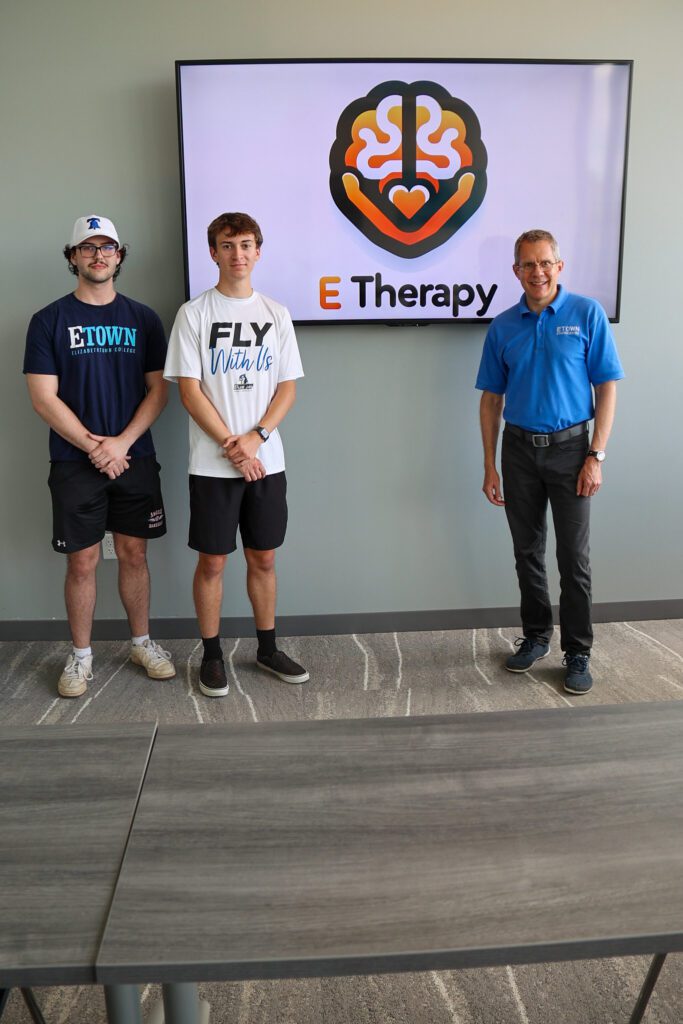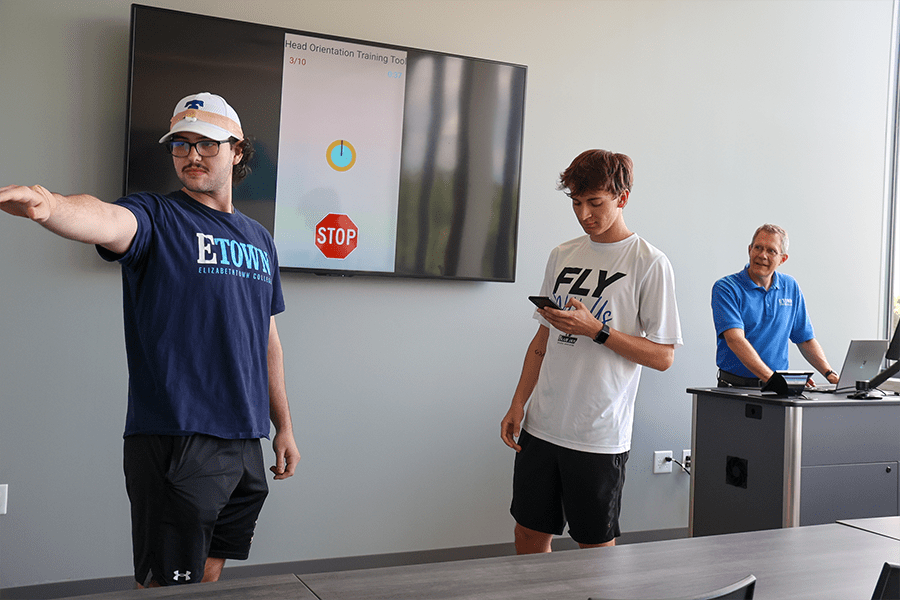Computer Science majors Joey Wagner ’26 and Alexander Roop ’26 are working this summer to redevelop eTherapy, a mobile application previously designed by Elizabethtown College students and faculty to provide biofeedback in occupational therapy and physical therapy sessions. Wagner and Roop are developing a new custom tool for a group of Etown Occupational Therapy students to take with them to a regional clinic this fall to work with head injury patients.
Working alongside Professor of Engineering & Physics Kurt DeGoede as part of the Summer Creative Arts and Research Program (SCARP), the Blue Jays are creating a system using Bluetooth sensors to track patients’ motion from the head and arms, which now include haptic functionality for more accurate results. Wagner and Roop’s research is a continuation of over 10 years of collaboration between various Etown Engineering and Occupational Therapy students and faculty.
Title of Research
eTherapy 2024
Student Researchers
Joey Wagner ’26 and Alexander Roop ’26 (Computer Science majors with concentrations in Data Science)
Faculty Mentor
Kurt DeGoede, Professor of Engineering & Physics![]()
What are you researching?
Wagner: This project involves the development of a new Android application based on one developed in previous SCARP projects called eTherapy. This app uses Bluetooth sensors to track body movements and create workouts for therapy patients. The sensors previously used are no longer accessible, so this project is converting some of the old code to implement these new sensors as well as creating a new exercise for occupational therapists to give to their patients. The new exercise involves the patient wearing a sensor on their wrist and forehead. They will be moving their arm to different places and angles and then trying to match the orientation of the sensors with their head. The idea of this is that it will provide therapy for their neck.
Roop: We are transitioning an old eTherapy app made by previous SCARP students to new sensors. The sensors used by the old app are no longer usable, and thus we working to implement new sensors for the app as well as additional therapy options.
Why did you choose this topic?
Wagner: I chose this project for the valuable experience and the opportunity to help others. As a student at Elizabethtown College, Educate for Service is a large part of my education, and this project seemed like a great opportunity to embody that motto. Not only am I building on my experience developing Android apps from my previous SCARP project, but I’m also using my knowledge to help others. That’s why when Dr. DeGoede asked me to spearhead this project, it felt like an obvious decision.
Roop: I had worked on developing apps previously but nothing to this extent. I wish to better understand what goes into app development and how working with other programmers would work in a real context.
What was the most interesting aspect of this research?
Wagner: My favorite part of this project is growing my app development skills, especially in Android Studio. There’s also the aspect of longevity that is unique to the eTherapy project, which has existed in one form or another for many years. Being a part of a project with such a rich history of strong Computer Science students is truly an honor.
Roop: The most interesting aspect of the research that we are doing, to me, is the sensors that we are working with and how we are getting the information from them. Essentially the sensors are giving us data based on their rotations and axes that allow us to calculate their distance and whether or not they are lined up. We have to manipulate the data given from the sensors so that they become usable information in the backend of the app while making any information we want the user to know about the sensors understandable when displayed.
What are you hoping to accomplish through this research project?
Wagner: I’d like to continue to grow as a programmer/app developer. The main goal, however, is to develop an app that is smooth, easy to use, and applicable for occupational therapy usage. First, that means creating a good foundation for the app and then developing the new exercise involving the head and wrist sensors. Once we’ve completed those two things, our goal will be to implement as many features from the old eTherapy as possible.
Roop: I am hoping that through this research I will have a better understanding of what it takes to succeed in the programming world while developing my skills of app development and problem-solving. I’ll also complete an app that will be helpful for Occupational Therapy and can be used by those who need it.
Talk about working with your mentor. How have they helped you throughout this experience?
Wagner: Dr. DeGoede is always a driving force in these environments. He’s the one that encouraged me to take on my first SCARP project last summer and he did the same this summer. DeGoede has a strong understanding of the mathematical and mechanical side of things and is great at explaining things that we struggle to understand. This makes us a great team, since Alex and I have a good understanding of the technical side of things, while he fills in the mathematical gaps. Overall, working with DeGoede has been a pleasure and I look forward to my continued collaboration with him.
Roop: Dr. DeGoede has helped greatly with understanding the sensors as well as the direction that the app should be going. Things such as how we display different information to the user and how to get the information that we need from the sensors greatly come from the information he provides us which allows us to understand better the approach we should take on the back and front end of the application.
Hear from the faculty mentor — Kurt DeGoede
“Joey and Alex are fabulous. The two work beautifully together as a team and have hit the ground running on this new generation of the eTherapy tool. I check in with them every few days, but they function as an independent professional application development team. As they move forward they are actively solving problems, working with the hardware vendor, and digging into challenging topics such as quaternion mathematics as needed to move the project forward. I can’t wait to see how far we can take this project in 2024!”

